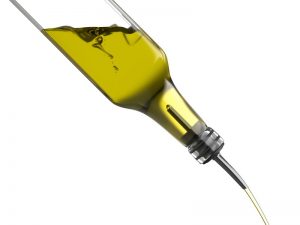No Oil — Not Even Olive Oil!
It’s about time the Olive Oil myth was laid to rest.
The Mediterranean Diet Myth
The Mediterranean Diet made the consumption of olive oil popular. Many studies can be found boasting of a decreased risk of cardiovascular disease with this diet rich in olive oil. [1,2]
However, contrary to what has been claimed (and promoted through clever marketing techniques), olive oil is not heart healthy.
[mks_boxquote align=”left” width=”200″ arrow=”right”]The Mediterranean Diet is healthy IN SPITE OF olive oil, not because of it[/mks_boxquote]The studies promoting the “heart healthy” effects of olive oil compared two groups of people: one eating a modern Westernised diet high in saturated fat (butter, cream, animal fats, lard, and so forth) with lots of meat and processed foods and modern sedentary living and compared this diet with the tiny Island of Crete during a period of extreme hardship after World War II. A diet with little to no meat, mostly fish (this would have made their diet higher in monounsaturated fats – the fat found in higher quantities in olive oil) and fresh vegetables and fruit combined with manual labour. It turns out that Mediterranean Diet is healthy IN SPITE OF olive oil, not because of it
Don’t ruin your healthy meal by drowning it in oil!
In other words, these studies compare mostly Western-style diets to slightly-improved versions of these unhealthy diets (i.e. Mediterranean Diet). What we should really be testing is people already on a healthy diet (like the traditional Asian low-fat, plant-based diet) to those on a Mediterranean Diet.
To put it in a different way, does adding olive oil to a healthy plant-based diet that already has a very low risk of cardiovascular disease lower risk even more? The answer is – No. One illustrative point can be seen through intervention studies where changes in diet and components of a diet are directly monitored.
One animal study tested rabbits on a normal diet and then added in olive oil. [3] This would be an intervention study. Tests were done to investigate for fatty streak formation (initial formations of artery-clogging plaques) in coronary arteries surrounding the heart. The stated results from study investigators: “Normal diet plus olive oil significantly enhanced fatty streak formation in left coronary arteries and aorta.
All Oils Are Processed Nutrient Poor ‘Foods’
Caldwell Esselstyn Jr MD of Cleveland Clinic has shown heart disease can be reversed 100% of the time, using a plant-based diet. Olive oil — and ANY oil — increases heart disease, the same way butter does. If you want to avoid heart disease and cancer, ditch all oils, which are in any case just highly processed (i.e., junk) food.
The following image compares a spoonful of sugar with a spoonful of Olive Oil. As you can see the Olive Oil comes out as nutrient poor as the sugar except for the fact that it pacts on twice the calories. With over 4,000 calories per pound, olive oil is far more calorie dense than even pure refined sugar, which has 1,725 calories per pound.
[mks_boxquote align=”right” width=”200″ arrow=”left”]
Just Two Tablespoons of Olive Oil Packs In 240 Calories
[/mks_boxquote]
The human body needs a certain amount of fat in order to function. Triglycerides, cholesterol and other essential fatty acids—the scientific term for fats the body can’t make on its own—store energy, insulate us and protect our vital organs. They act as messengers, helping proteins do their jobs. They also start chemical reactions that help control growth, immune function, reproduction and other aspects of basic metabolism.
However Fat in itself is NOT a food, it is something found in food. There is a difference. And to throw oil into the ‘essential fat’ category has been the greatest smoke screen disguise of any other food product out there.
First of all fat is abundantly available in today’s modernized high processed diet. The very thought that one has to supplement fat into their diet is ludicrous. So can people get better from changing to olive oil? Yes. Anytime you go from worse to bad you see improvements, but less risk of heart disease does not equal no risk of heart disease. While olive oil may be less bad than saturated fats and trans fats at least in terms of its impact on blood lipids, that hardly makes it a ‘good’ or ‘healthy’.
All oils are highly processed foods. There is no oil naturally occurring in nature. It needs to be pressed and extracted out of something else. Our ancestors did not eat oil. The best way to get your needed essential fatty acids is by eating whole natural foods and not by dowsing oil onto the food. By adding processed fats (butter, oil, margarine) into our diets we have actually managed to create a new form of deficiency -an essential fatty acid deficiency.
This following eye-opening lecture snippet with Jeff Novick will help you understand the skinny on fats.
Again, I am not promoting here a fat-free diet instead I am advocating to get your essential fat needs from actual food instead of oils. According the the American Heart Association in a daily 2,000 calories diet, around 500 calories (or 55 grams) should come from fat and only 14 grams must come from saturated fats. So you can see how quickly your fat quota get topped up when using oil. To stay within those guidelines you would have to eat an extremely lean diet (low-fat everything) all for the sake of adding a bit of oil…
And if you think ‘a little in moderation’ will do, think again.
Remember the rules are slightly different on a High Fat – High Protein Diet. For now as far as we understand it is that if you are going to make High Fat-High Protein work for you, you need to stay Low Carb. But you can not be on a High Fat – High Carb diet because those are the two macro nutrients when combined in high ratios will create metabolic havoc.
Here is another great video by Dr. Michael Klaper MD who is an experienced clinician with over 40 years of clinical experience and who practices preventative and nutrition-based medicine.
So next time when choosing a cooking oil at the super market you won’t have to sweat about it. What kind of oil you pick will only make a marginal difference at best. If you really want to make a healthier change start learning to cook without oils so you can enjoy more wholesome foods that come with natural fat.
References:
1 Covas MI, Konstantinidou V, Fitó M. Olive oil and cardiovascular health. J Cardiovasc Pharmacol. 2009 Dec;54(6):477-82. doi: 10.1097/FJC.0b013e3181c5e7fd. Review.
2 Dalen JE, Devries S. Diets to Prevent Coronary Heart Disease 1957-2013: What Have We Learned? Am J Med. 2013 Dec 30. pii: S0002-9343(13)01111-X. doi: 10.1016/j.amjmed.2013.12.014. [Epub ahead of print] Review.
3 Hosseini M, Asgary S. Effects of dietary supplementation with ghee, hydrogenated oil, or olive oil on lipid profile and fatty streak formation in rabbits. ARYA Atheroscler. 2012 Fall;8(3):119-24.






